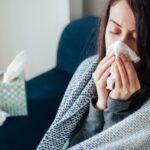New COVID-19 advice has been added to the updated Asthma Handbook, including drug and vaccine timing.
Asthma and allergic rhinitis patients are safe to have the COVID-19 vaccination, regardless of medication use or the condition’s severity, according to new expert guidelines.
The National Asthma Council Australia just updated its Australian Asthma Handbook to guide GPs managing patients through this year’s flu and COVID-19 vaccine rollouts.
Professor Nick Zwar, chair of the guidelines committee, said that asthma patients should continue taking their medicines as usual before and after the jab, and should seek to get vaccinated against the coronavirus as soon as possible.
Asthma patients using monoclonal antibodies also had no need to fear, according to Professor Zwar and colleagues.
Despite initial concerns from abroad, experts now believe that the therapies do not interfere with the COVID-19 vaccine.
Nevertheless, Professor Zwar said that while drugs such as dupilumab, omalizumab, benralizumab and mepolizumab don’t suppress the immune system, it’s preferable not to administer a biologic and the vaccine on the same day.
This is so that side effects can be more easily disentangled.
Just like other inoculations, precautions are needed for those with severe allergies or who have had anaphylaxis, he added. Clinicians should also be alert to allergic reactions to either the vaccine or its components after the first dose.
In Australia, patients with mild or moderate asthma are not prioritised in the queue for inoculation. As a result, they need to speak to their GP about how to time both the flu and COVID-19 vaccinations.
Those with chronic lung disease, such as severe asthma, should be eligible for the phase 1b rollout, Professor Zwar noted.
While the GP-led phase of the vaccination schedule has now begun, many clinics have complained about not receiving, or receiving only a small number of COVID-19 jabs. With the National Immunisation Program rollout of the flu vaccine pegged to start in April, patients may be offered the flu vaccine first.
The separate vaccines should be given at least 14 days apart, according to health authorities.
The Department of Health currently advises people in phase 1a to take their COVID-19 jab as soon as possible, and then get their influenza vaccine after the appropriate delay.
Conversely, those who can’t access the COVID-19 vaccination immediately should prioritise the influenza jab, followed by the COVID-19 vaccine when possible.
The updated guidelines also recommend patients continue taking their preventer during the pandemic, as this reduces the risk of severe flare-ups triggered by viral respiratory infections.
“For patients using inhaled corticosteroid-containing medicines (regular preventers, as-needed combination relievers, or maintenance-and-reliever therapy), reassure them that these should be continued and that they reduce their risk of severe asthma flare-ups,” said the guidelines.
Now is a good time to ensure that patients have a current, written asthma action plan and that they understand and have the necessary medication, it continues.
The guidelines warn against using spirometry or peak expiratory flow on patients with symptoms of COVID-19 or another viral illness, have a fever or an escalating acute respiratory condition.
Nebulisers should also be avoided if possible.
The Australian Technical Advisory Group on Immunisation (ATAGI) has provided advice on timing the influenza and COVID-19 vaccines which you can read here.



